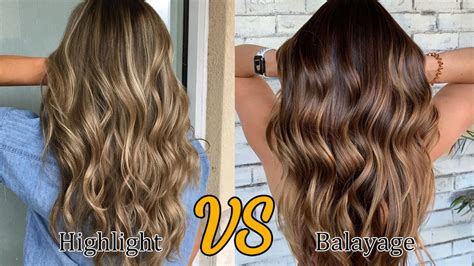Introduction

Balayage and highlights are two popular hair coloring techniques that can elevate your look and add depth and dimension to your locks. While both techniques aim to brighten your hair, they differ in their application methods, results, and maintenance requirements. This comprehensive guide will compare balayage and highlights, empowering you to make an informed decision that suits your hair goals and preferences.
Balayage: The Freehand Technique for Natural-Looking Results
Balayage, a French word meaning “to sweep,” involves a freehand painting technique. A hairstylist uses a brush to apply lightener directly to sections of hair, creating seamless blends and a sun-kissed effect. Balayage offers a more natural and gradual color transition, with lighter strands framing your face and gradually fading into your natural hair color.
Key Features of Balayage:
- Freehand application for natural-looking transitions
- Mimics the effects of sun-kissed hair
- Can be customized to suit any hair color and texture
- Low maintenance with minimal touch-ups required
- Ideal for those seeking a subtle and gradual color change
Highlights: Traditional Precision for Bold and Defined Results
Highlights, also known as foils, involve a more precise approach. The hairstylist selects specific sections of hair and places them in aluminum foils or plastic caps. Lightener is then applied to these sections, resulting in bold and defined color streaks. Highlights offer more control over the placement and intensity of color, allowing for a range of looks, from subtle to dramatic.
Key Features of Highlights:
- Precise application for controlled color placement
- Creates distinct and defined color streaks
- Versatile technique suitable for various hair textures
- Higher maintenance with more frequent touch-ups needed
- Ideal for those seeking a bolder and more noticeable color change
Comparing Balayage and Highlights: A Detailed Analysis
To help you better understand the differences between balayage and highlights, here is a detailed comparison:
| Feature | Balayage | Highlights |
|---|---|---|
| Application Method | Freehand painting | Foils or plastic caps |
| Color Transition | Gradual and natural | Bold and defined |
| Maintenance | Low maintenance, infrequent touch-ups | Higher maintenance, frequent touch-ups |
| Suitability | Natural-looking effects, subtle color changes | Bold effects, dramatic color changes |
| Cost | Generally less expensive | Generally more expensive |
Choosing the Right Technique for You
The choice between balayage and highlights ultimately depends on your personal style and hair goals. Here are some guidelines to help you decide:
- Natural and Subtle: Balayage is perfect if you prefer a more natural and low-maintenance look.
- Bold and Defined: Highlights are the way to go if you want more noticeable color streaks and don’t mind frequent touch-ups.
- Hair Texture: Both balayage and highlights are suitable for all hair textures, but consultation with your hairstylist is recommended for optimal results.
Common Mistakes to Avoid
To ensure a successful balayage or highlight session, avoid these common mistakes:
- Over-Bleaching: Excessive bleaching can damage your hair, causing it to become dry and brittle.
- DIY Attempts: Professional hair colorists have the expertise to achieve the best results. Avoid attempting balayage or highlights at home.
- Unrealistic Expectations: Don’t expect dramatic color changes from a single balayage or highlight session. The process often requires multiple sessions for optimal results.
- Ignoring Hair Health: Pre- and post-color care is essential for maintaining healthy hair after balayage or highlights.
Introducing “Chromage”: A Hybrid of Balayage and Highlights
For those seeking a technique that combines the best of both worlds, consider “chromage.” This innovative technique involves a blend of balayage and highlights, creating a seamless transition with bolder color streaks. Chromage offers a customizable and flattering look for various hair types.
Effective Strategies for Balayage and Highlights
To achieve stunning results with balayage or highlights, follow these strategies:
- Consult a Professional: Seek expertise from a qualified hair colorist to discuss your desired look and choose the best technique for your hair.
- Research and Gather Inspiration: Explore different balayage or highlight styles online or in magazines to find inspiration and communicate your vision to your hairstylist.
- Use Quality Products: Invest in professional-grade shampoos, conditioners, and color-protecting sprays to maintain the vibrancy and longevity of your color.
- Touch Up Regularly: Schedule timely touch-ups to maintain the desired color and prevent fading or brassiness.
Benefits of Balayage and Highlights
Balayage and highlights offer a range of benefits that can enhance your overall appearance:
- Youthful Glow: Lightened strands can create an illusion of brighter skin and a more youthful complexion.
- Enhanced Texture: Color adds depth and dimension to your hair, making it appear fuller and more voluminous.
- Conceals Gray Hair: Balayage or highlights can effectively blend and disguise gray hairs without creating a harsh or unnatural contrast.
- Personalized Look: Both techniques allow for customization to suit your unique hair color, texture, and style preferences.
Conclusion
Balayage and highlights are versatile hair coloring techniques that can add beauty and vibrancy to your locks. Whether you prefer a natural and subtle look or a more dramatic and defined effect, there is a technique to match your desires. By understanding the differences between balayage and highlights and following the strategies outlined in this guide, you can achieve stunning results that will leave you feeling confident and radiant. Remember, consultation with a qualified hair colorist is crucial to ensure the best possible outcome for your hair.
